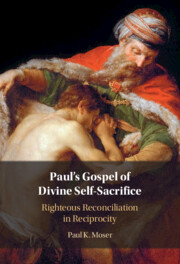Book contents
- Paul’s Gospel of Divine Self-Sacrifice
- Paul’s Gospel of Divine Self-Sacrifice
- Copyright page
- Epigraph
- Contents
- Preface
- 1 Gospel of Righteous Self-Sacrifice
- 2 Faith Grounded in Self-Sacrifice
- 3 Incarnational Ethics of Self-Sacrifice
- 4 Hope and Fear toward Divine Self-Sacrifice
- 5 Responsible Agency toward Divine Self-Sacrifice
- 6 Assessing God’s Gambit in Self-Sacrifice
- Select Bibliography
- Index
3 - Incarnational Ethics of Self-Sacrifice
Published online by Cambridge University Press: 08 September 2022
- Paul’s Gospel of Divine Self-Sacrifice
- Paul’s Gospel of Divine Self-Sacrifice
- Copyright page
- Epigraph
- Contents
- Preface
- 1 Gospel of Righteous Self-Sacrifice
- 2 Faith Grounded in Self-Sacrifice
- 3 Incarnational Ethics of Self-Sacrifice
- 4 Hope and Fear toward Divine Self-Sacrifice
- 5 Responsible Agency toward Divine Self-Sacrifice
- 6 Assessing God’s Gambit in Self-Sacrifice
- Select Bibliography
- Index
Summary
This chapter contends that Paul has a coherent approach to ethics and the law of God if understood with an incarnational and a reconciliatory component for Christ and his disciples. It gives special attention to his idea of “the law of the Spirit of life in Christ Jesus. The chapter relates Paul’s approach to ethics and the law of God to reparative self-sacrifice. It thus gives a primary role to a divine lawgiver, above the law itself, thereby enabling the kinds of changes in the law and in the covenants acknowledged by Paul. The chapter attributes a key role in Paul’s perspective on ethics and the law to the promise of the new covenant in Jeremiah and Ezekiel. The chapter contends that Paul aimed to uphold the law of God, not to nullify it, through faith in God, and that he acknowledged “the law of Christ” as exemplifying the law of God. He also recognized the law of God in terms of “the law of the Spirit of life” in Christ Jesus. Paul acknowledged his dying to (the works of) the law in order to “live to God” and to Christ, in a way that reciprocates divine self-sacrificial love.
Keywords
- Type
- Chapter
- Information
- Paul's Gospel of Divine Self-SacrificeRighteous Reconciliation in Reciprocity, pp. 80 - 104Publisher: Cambridge University PressPrint publication year: 2022

